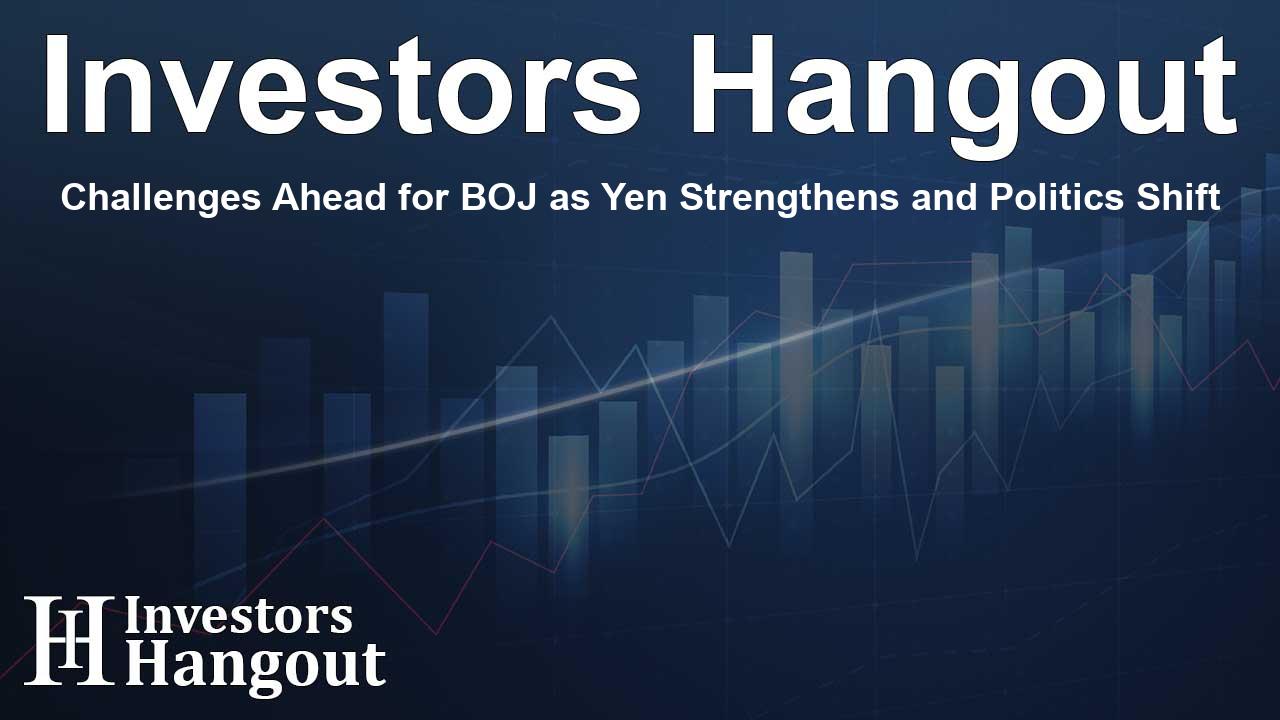Challenges Ahead for BOJ as Yen Strengthens and Politics Shift

Challenges for the Bank of Japan Amid Political Shifts
The Bank of Japan (BOJ) is navigating a complex landscape as political changes and fluctuations in the yen influence its monetary policy. Governor Kazuo Ueda's ambition to raise borrowing costs encounters new obstacles, particularly as a recent yen rebound and the preferences of new political leadership concerning low rates add layers of difficulty.
New Political Leadership's Influence on Monetary Policy
Recently, Japan's new Prime Minister Shigeru Ishiba surprised many by stating that the economy is not prepared for further increases in interest rates. This comment marks a significant shift from his earlier stance supporting a gradual exit from the BOJ's extended period of aggressive monetary stimulus.
Market Reactions to Political Statements
Ishiba’s frank remarks led to a decline in the yen relative to the dollar, stirring uncertainty about the BOJ's forthcoming decisions on interest rates. Analysts speculate that while Ishiba’s statements might not have been aimed to pressure the BOJ excessively, they were made with the upcoming general election in mind, which is set for late October.
Potential Impact on Upcoming BOJ Meetings
The anticipated election plays a crucial role in the BOJ’s strategy, leading many analysts to believe that the central bank may pause any rate increases during its meeting scheduled for the end of the month. Ueda, who has been in his position since last year, had been previously supported by former Prime Minister Fumio Kishida, who advocated for moving away from extreme monetary easing.
Rate Hikes and Inflation Landscape
In March, the BOJ made its first interest rate hike in 17 years, a significant move based on a perceived shift in Japan’s economic dynamics, notably an increase in prices and wages. Nonetheless, the recent reaffirmation of the BOJ's commitment to a 2013 economic focus on stimulating a stagnant economy complicates its path forward.
The Yen’s Role in Economic Adjustments
Pressure for further rate adjustments eased with the yen's recovery from a three-decade low. This shift helps mitigate inflation stemming from import costs, enabling the BOJ to contemplate pauses in its rate-hiking efforts. Ueda has already indicated that the BOJ is in no immediate rush to make decisions as the market remains volatile and uncertainties regarding the U.S. economy persist.
Communication Challenges for the BOJ
Political developments may not directly dictate monetary policy, but they certainly provide justification for the BOJ to delay action. Concerns over communication and clarity were voiced by BOJ board member Asahi Noguchi, who emphasized the necessity of improving messaging to avoid confusion among market participants regarding policy changes.
Uncertain Political Future and Its Implications
The impending lower house elections introduce a layer of uncertainty regarding Ishiba's support for the BOJ's strategies post-election. Surveys indicate that Ishiba’s approval ratings are modest, signaling a challenging electoral contest that could complicate his stance on economic policy should his party retain power without significant losses.
Forecasting the BOJ's Future Actions
Should Ishiba emerge victorious and stabilize the political landscape, analysts suggest that the BOJ could initiate additional rate hikes as early as December or January. However, if political strife continues, the BOJ’s plans to raise rates towards 0.75% next year might face significant hurdles, complicating the central bank’s broader strategy.
Long-Term Perspectives on Policy Directions
Ultimately, the path ahead for the Bank of Japan is layered with political and economic uncertainties. As it grapples with these challenges, the institution aims to tread carefully while balancing the need for timely adjustments to its monetary policy framework.
Frequently Asked Questions
What challenges is the BOJ currently facing?
The BOJ faces challenges related to political changes and yen fluctuations that complicate decisions on raising interest rates.
How has the new Prime Minister affected the BOJ's policy?
Prime Minister Ishiba's statements against immediate rate hikes have raised uncertainty about the BOJ's future policy direction.
What recent actions did the BOJ take regarding interest rates?
The BOJ raised interest rates in March for the first time in 17 years, indicating a shift in monetary policy.
What role does the yen play in the BOJ's decision-making?
A rebound in the yen affects inflation and import costs, which are crucial for the BOJ's considerations on rate hikes.
What are the implications of the upcoming elections for the BOJ?
The results of the elections could significantly influence the BOJ's monetary strategy and potential future rate adjustments.
About Investors Hangout
Investors Hangout is a leading online stock forum for financial discussion and learning, offering a wide range of free tools and resources. It draws in traders of all levels, who exchange market knowledge, investigate trading tactics, and keep an eye on industry developments in real time. Featuring financial articles, stock message boards, quotes, charts, company profiles, and live news updates. Through cooperative learning and a wealth of informational resources, it helps users from novices creating their first portfolios to experts honing their techniques. Join Investors Hangout today: https://investorshangout.com/
Disclaimer: The content of this article is solely for general informational purposes only; it does not represent legal, financial, or investment advice. Investors Hangout does not offer financial advice; the author is not a licensed financial advisor. Consult a qualified advisor before making any financial or investment decisions based on this article. The author's interpretation of publicly available data shapes the opinions presented here; as a result, they should not be taken as advice to purchase, sell, or hold any securities mentioned or any other investments. The author does not guarantee the accuracy, completeness, or timeliness of any material, providing it "as is." Information and market conditions may change; past performance is not indicative of future outcomes. If any of the material offered here is inaccurate, please contact us for corrections.